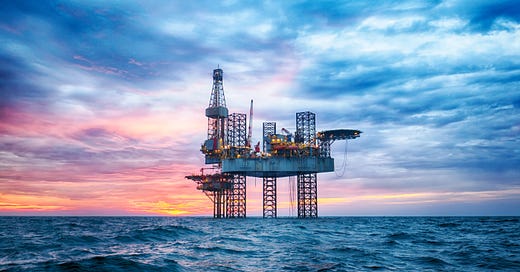Emerging Markets Daily - January 17
Oil Price Closing In on $100, Houthi Drones Hit Abu Dhabi, S. Korea Stocks Drop, China Economy, India Inc. Bonds a Big Hit, Petroleum 'By the Numbers'
The Top 5 Stories Shaping Emerging Markets from Global Media - January 17
Oil Prices in Striking Distance of 7 Year High - Some Analysts See $100 Brent in ‘22
Financial Times
“Oil prices traded within striking distance of a seven-year high on Monday, threatening to drive global inflation up further as supply remained constrained and fears of another pandemic-induced slowdown in demand faded.”
“Brent, the international benchmark, has climbed more than 10 per cent in the first two weeks of the year to as much as $86.71 a barrel, exceeding last October’s high, to approach levels not seen since 2014 when oil topped $115.”
“US oil benchmark West Texas Intermediate has risen more than 12 per cent since the start of year to a high of $84.78, just under last year’s peak. Some analysts are forecasting that the crude benchmarks will trade at more than $100 a barrel again this year unless there is a significant increase in supply.”
“The White House has been calling on the world’s leading oil producers to increase production faster to help control inflation. But Opec and its allies have stuck to a plan agreed in July last year to replace output cut at the start of the pandemic gradually, by just 400,000 barrels a day each month.” Tom Wilson reports.
Iran-Backed Houthis Claim Drone Strike on UAE Capital, Three Die
Bloomberg
“Iran-backed Yemeni fighters said they launched drone strikes on the United Arab Emirates that caused explosions and a fire on the outskirts of the capital Abu Dhabi leaving three people dead, ratcheting up tensions in the critical oil-exporting region.”
“One of the biggest attacks to date on UAE soil ignited a fire at Abu Dhabi’s main international airport and set fuel tanker tanks ablaze in a nearby industrial area. Initial information suggested there was little or no impact on departing or arriving flights, according to a search of the tracking website FlightRadar24.”
“Iran’s longtime support of the Houthis means the incidents could roil diplomatic efforts to ease tensions in the Persian Gulf, and separate talks to restore Tehran’s 2015 nuclear deal with world powers.”
“A preliminary investigation indicates small flying objects, likely drones, fell in both incidents and may have triggered the blasts, the UAE’s state-run WAM news agency said on Monday. Three people -- two Indians and one Pakistani -- were killed and six others injured in the fuel-tank fire close to the storage facilities of state-run oil group Adnoc, Abu Dhabi police said in a statement.”
“The Persian Gulf has seen a series of attacks on shipping and oil facilities since the U.S. withdrew from the nuclear deal with Iran in 2018. Washington has blamed the attacks on Iranian-backed militias, including Houthi fighters in Yemen, where a Saudi-led military coalition is battling the group.”
“The Houthis regularly attack the UAE’s neighbor Saudi Arabia with missiles and drones. Though they rarely cause casualties, a strike on a major Saudi oil facility in 2019 shook global markets and raised fears of a new conflict in the Middle East. The latest incident follows an uptick in maritime attacks in recent weeks as talks to revive the 2015 nuclear deal enter a critical stage and fighting escalates in Yemen.”
“The latest attacks come days after the Houthis warned Abu Dhabi against increased military involvement in Yemen’s energy-rich province of Shabwa. Forces loyal to Yemen’s internationally-recognized government drove the Houthis out of three districts of the province in a 10-day offensive in recent weeks, helped by intense Saudi and UAE air strikes.” Bloomberg reports.
South Korea Stocks Near Seven Week Low on Inflation Fears; Korea Won Falls
Korea Herald
“South Korean stocks dropped to their lowest in almost seven weeks on Monday as investors dumped holdings on concerns about mounting inflationary pressure. The Korean won fell against the US dollar.”
”The benchmark Korea Composite Stock Price Index (KOSPI) slid 31.82 points, or 1.09 percent, to close at 2,890.1 points. The reading marked the lowest closing since Nov. 30.”
”After a weak start, the key stock index fell below the 2,900-point level intraday for the first time in about six weeks and the losses extended later amid concerns over rising inflationary pressure at home and in the United States.”
”Last week, central banks in major countries, including the Bank of Korea and the US Federal Reserve, hinted at the possibility of aggressive monetary tightening this year.
Analysts partially attributed the KOSPI's loss to the upcoming mega initial public offering (IPO) of LG Energy Solution Ltd.”
”Ahead of the South Korean battery maker's IPO set for this month, investors were cashing in on overvalued stocks to join the process. ‘Unlike their Asian peers, the local stock markets are lacking the (usual) liquidity, due to the upcoming blockbuster IPO event,’ Shinhan Investment Corp. analyst Choi Yoo-joon said.” Korea Herald reports.
China Seeks to Cushion Blow of Economic Pain as Momentum Stalls
Wall Street Journal
“Last year, Chinese policy makers shook up the world’s second-largest economy just as its rebound from the pandemic was starting to wear off, unleashing a flurry of measures to address longer-term economic imbalances—and delivering a short-term hit to business activity.”
“Now, China’s leaders are hoping that they can put a floor under the economy, which officials said Monday expanded by just 4% in the fourth quarter of last year, the slowest pace since the beginning of the Covid-19 recovery in the second quarter of 2020.”
“To do so, they are easing some of their earlier tightening policies, for example by increasing mortgage lending to home buyers. The country’s central bank on Monday cut two key interest rates that could pave the way for further cuts to the benchmark lending rate.”
“But they face rising uncertainty around the spread of the Covid-19 pandemic, as well as a continued property-market slump and what economists say is a looming drop-off in export demand during a politically important year. Chinese leader Xi Jinping is expected to break with recent precedent and seek a third term as leader at a closely watched Communist Party meeting later this year, and the political imperative for growth and stability have raised the likelihood that Chinese policy makers respond to any weakness by easing some of its regulations.” Stella Yifan Xie reports.
India Inc. Bonds a Big Hit - $6 Billion Raised in Two Weeks
Economic Times
“Indian companies raised $6 billion selling offshore bonds during January 1-14, the most in the first fortnight of a year, showing the confidence of international investors in India's economy despite looming uncertainties globally.”
A mix of borrowers including Reliance Industries, State Bank of India, JSW Infrastructure, Shriram Transport Finance, and India Clean Energy have also managed to tighten their funding cost by 30-35 basis points from initial projections, after getting bids several times the offer size.”
”The Indian issues have received strong interest at a time when investors are mostly apathetic about other emerging markets, especially China. ‘Emerging consensus is that India by and large is delinked from most EMs and does constitute a separate asset class,’ said Amrish P Baliga, managing director, Deutsche Bank India. ‘Indian issuers are viewed as quality credit with tightening yields reflecting the same.’” Saikat Das reports.
Emerging World - By the Numbers - Petroleum Edition
Emerging World
As oil prices continue to tick upward, it’s worth remembering that fossil fuels still play a dominant role in our global energy mix. In fact, 83% of the worldwide energy mix comes from fossil fuels. Of that number, 56% is oil and natural gas alone. Yes, we are still moving toward an energy transition, but it could take considerably longer than we think - as we noted in this column - Why Petroleum (Still) Matters
Here’s a look at “By the Numbers” - Petroleum Edition
Petroleum - By the Numbers
83% - The amount of the energy mix worldwide made up of fossil fuels
56% - The amount of the energy mix made up of oil and natural gas
$628 Billion - The amount spent on global oil and gas investments in 2021
729 - The number of rigs operating in North America, up by half from last year
12.4 Million - Record-breaking barrels per day of expected output from the US in 2023
$75 - The average forecasted price for Brent crude in 2022, by the EIA
100.5 Million - barrels per day of global petroleum and liquids consumption in 2022, according to EIA
Sources; WSJ, FT, EIA, Rystad Energy
“If you can’t fly then run, if you can’t run then walk, if you can’t walk then crawl, but whatever you do you have to keep moving forward.” - Martin Luther King Jr.






